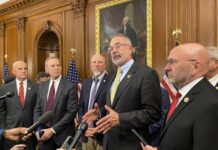
WASHINGTON (GA Recorder) — Make it simpler to apply for rental assistance money. Allow landlords to apply on behalf of unresponsive tenants. And consolidate two overlapping federal programs aimed at getting financial help to struggling renters.
Those are among the proposals that U.S. House members are weighing to better help states and local governments that have moved far too slowly in getting federal emergency rental assistance money to tenants who need that aid.
Of the $46.5 billion approved by Congress to help renters who fell behind on payments amid the pandemic, only $5.1 billion had been distributed by the end of July, according to Treasury data.
Some states and localities have done better than others, according to housing advocates who testified Friday before the House Financial Services Committee.
New Jersey has distributed 61% of the state’s allocation from the first round of congressional rental assistance money.
Virginia, Texas and the District of Columbia all have distributed more than half of those dollars, according to Diane Yentel, president and CEO of the National Low Income Housing Coalition.
More than a dozen cities and counties have spent more than 80% of their initial allocations, Yentel said. Her written testimony noted that those higher-spending localities include Philadelphia; Leon County, Fla.; and Milwaukee County, Wis.
Struggles in Georgia, Tennessee
But those success stories have been the outliers, she said, adding that 17 states and many localities have spent less than 10% of their allocation, including Georgia and Tennessee.
And city and state officials in Georgia are still working to speed up the delivery of more than $500 million in federal aid meant to help renters pay their landlords and keep people off the streets as COVID-19 spreads in communities across the state.
The Georgia Department of Community Affairs has about 150 staffers who have worked to comb through 13,000 renters’ applications filed since March and is asking the tenants to urge their landlords to also turn in documents for the program.
The reasons for the delays nationally have varied. Some localities were hamstrung by the need for a state legislature or city council to sign off on a new program, while some received more money than they needed. Others struggled to get landlords or tenants to participate.
And even after federal officials increased flexibility on the required documentation, such as allowing renters to self-attest that they meet eligibility requirements, fewer than 17% of programs allow that easier process.
“Slow-spending [rental assistance] programs tend to do little outreach. They don’t have enough staff to process applications. They have long and complicated applications with overly burdensome documentation requirements,” Yentel said.
She added that if simplified application practices remain optional, “many programs will not adopt them.”
While there’s bipartisan agreement that the rental assistance programs have moved too slowly, Democrats and Republicans disagree over how to get the money moving faster.
Rep. Maxine Waters, the California Democrat who leads the Financial Services panel, has drafted legislation aimed at addressing several of the concerns cited by Yentel, other advocates, and property management firms that also say they want to see the distribution speeded up.
Her proposal would allow landlords to directly apply for back rent after providing notice to their tenants and permit landlords to apply if a unit is vacant, so long as they did not evict the missing tenant.
It also would make it easier for tenants to show they meet requirements and would protect localities from liability if applicants are not in fact eligible.
Meanwhile, Republicans have their own proposal, authored by Rep. Patrick McHenry, (R-N.C.). It would consolidate the initial $25 billion rental assistance program authorized last year with the $21.6 billion program approved in March. Those programs have similar but not identical rules and requirements.
While Waters’ bill would lengthen the period for receiving assistance, McHenry’s legislation would speed up the timeline for spending all of those dollars.
Advocates, landlords weigh in
Margaret Salazar, executive director of the Oregon Housing and Community Services Department, testified Friday that her organization and others are anticipating that they will see even more demand in the months ahead and that her group supports extending the time period for receiving benefits, as Waters has proposed.
Salazar and her group also support proposals to offer liability protection to agencies distributing the aid: “State and local officials are on the line for meeting this unprecedented emergency, and we’re acting in good faith when we work to balance urgency and accountability,” she told lawmakers.
Speaking on behalf of landlords and property managers in his role leading the National Multifamily Housing Council, David Schwartz said the two bills under consideration “address many of our concerns,” such as streamlining documentation requirements.
He did express opposition to a requirement in the Democratic bill that conditions the rental assistance funds on a commitment that the tenant can remain in their housing for at least the next 120 days. Schwartz said that will amount to another eviction moratorium and one that could discourage landlords from participating in the program.
“There’s going to be a lot of reluctancy, and I think you’re going to kind of do the opposite of what the bill is intending to do,” he said.
It’s not yet clear if there will be enough support to approve any of the program overhauls when Congress returns later this month.
Congressional Democrats stumbled in an 11th-hour effort in July to extend federal eviction protections. After intense public pressure by some progressive Democrats, the Biden administration announced a ban on evicting renters in counties with high or substantial rates of community COVID-19 transmission.
But that extended ban was challenged by landlords and real estate companies, who argued that the Centers for Disease Control and Prevention moratorium was an overreach. Six members of the U.S. Supreme Court ultimately agreed, causing an abrupt end to that final moratorium extension — and increasing pressure to get as much rental aid out the door as quickly as possible.
Georgia Recorder Editor John McCosh contributed to this report.






